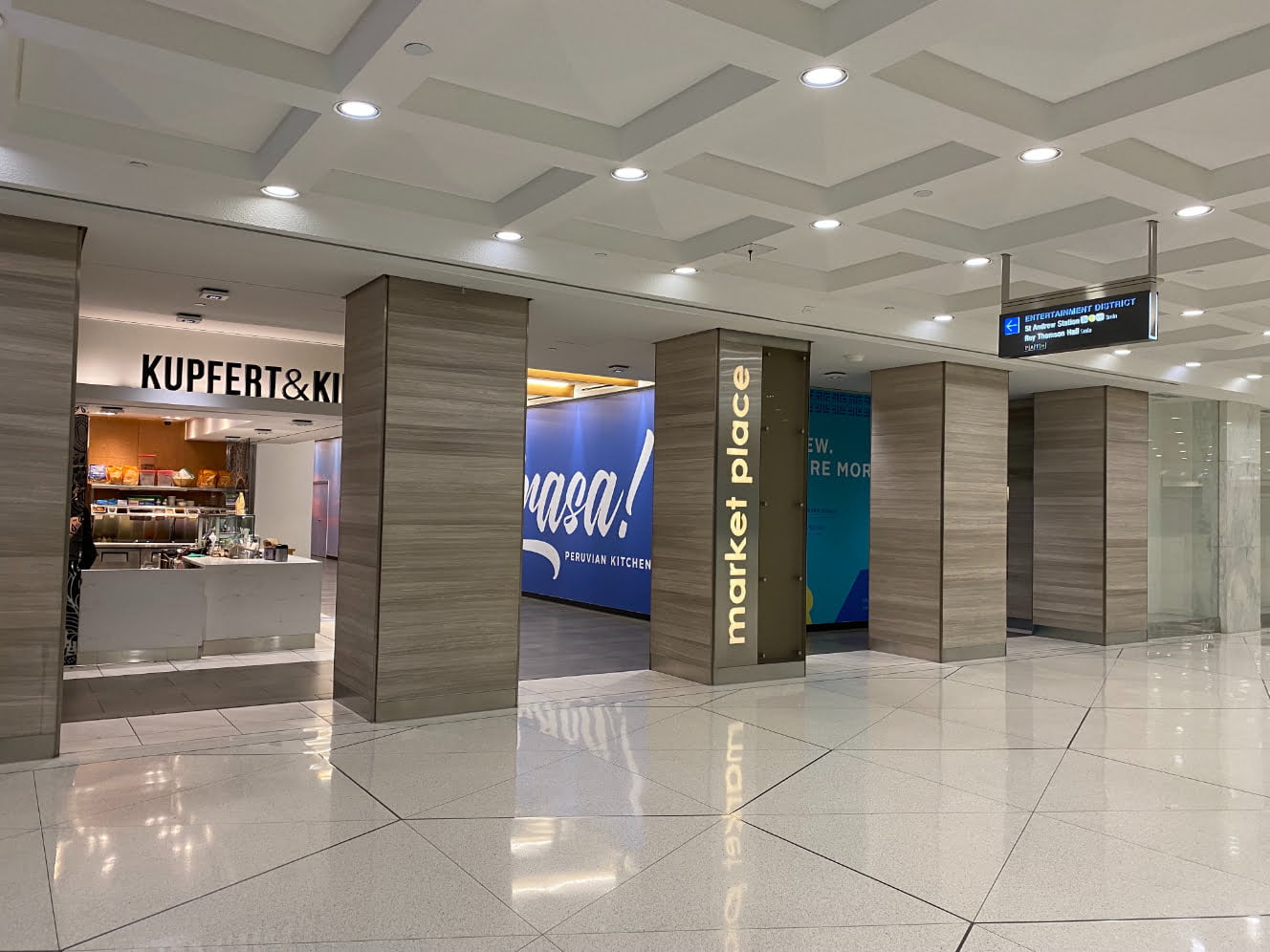Bayer
Senior Member
Long overdue, and a perfect time to do it.Renovation reveal at the Scotia Plaza food court. Much of it is still under construction.
Long overdue, and a perfect time to do it.Renovation reveal at the Scotia Plaza food court. Much of it is still under construction.
Prairie Girl Bakery have closed their location at the FCP section of the PATH system, which had been open since 2011. The bakery's president provides some commentary of their experience during the pandemic:

This is what it was like running a business in Toronto's deserted PATH for the last 4 months
Holding on to your business during a pandemic is no easy task. We've witnessed tons of businesses say goodbye to some or all of their locations. Pr...www.blogto.com
And the entire business is done.
That's a shame. Alot of the larger chains just cannot survive an extended shutdown. I would love to see a plan for the future by the various office towers involved.
The Path as created will be changed irreparably by the pandemic.
My thinking is that the PATH is in a unique situation. It's not really a commercial district in the traditional sense, but an amenity to the office towers. The major office asset managers will eventually subsidize and incentivize new businesses to replace the ones that died when this situation is over and people return to the office towers in large numbers.That's a shame. Alot of the larger chains just cannot survive an extended shutdown. I would love to see a plan for the future by the various office towers involved.
The Path as created will be changed irreparably by the pandemic.
Montreal's version of the PATH has less retail than ours (although, still a lot). I have to wonder if some PATH corridors will become just that with offices and/or communal working spaces lining them, instead of actual retail outlets.
/https://www.thestar.com/content/dam/thestar/news/gta/2021/09/03/how-long-will-torontos-downtown-be-a-ghost-town/_path.jpg)
/cloudfront-us-east-2.images.arcpublishing.com/reuters/PXZXVOHFXNNLZDV47CKAJB4W6A.jpg)
Where I used to get my haircut for years was at an outpost of a chain of hair salons in the PATH. Each had a different name, though similar look, and all the same ownership group.New article from Reuters about the future outlook of the PATH system retail:
/cloudfront-us-east-2.images.arcpublishing.com/reuters/PXZXVOHFXNNLZDV47CKAJB4W6A.jpg)
Toronto's underground PATH mall shops fret about hybrid work in towers above
Business is slowly starting to percolate again at the Second Cup coffee shop franchise in Toronto's PATH shopping mall as workers trickle back to major downtown office buildings above the world's biggest underground retail hub.www.reuters.com
Where I used to get my haircut for years was at an outpost of a chain of hair salons in the PATH. Each had a different name, though similar look, and all the same ownership group.
They closed down the one I went to in the TD Centre last October. Some of the staff were migrated to a location in the Exchange Tower. I booked an appointment there two weeks ago and they informed me that now the Exchange Tower location had closed too, and they consolidated it and two other locations in Scotia Plaza. When I went for my appointment there at 9:00 a.m. there was only one other customer, though they had space for ten in total. I think they had 10 locations in the Before Times. They are down to two now.
They said some of the stylists left on their own as they called around their customers over the summer and they said they were getting their hair done in salons in the suburbs close to where they lived now. The business is booming there from people who are working at home and also now have the flexibility to leave work for an "appointment". Also the fact many of these salon workers live out in the inner suburbs too makes it easier than a commute to the PATH, so they are leaving their PATH jobs for out there.
It's not just hybrid work at play either, it's that people are given more flexibility on hours too. If you worked 8:30 to 5:00 you used have to schedule your life around that, but suddenly managers are much more forgiving on when you are working from home. As long as you get the work done and meet deadlines, they don't care if it's at 6:30 p.m. instead of 11:30 a.m., so you can go out to appointments or shopping during the day sometimes for an hour. Also when you do go into the office it's more flexible too. Like if you have some task that requires you to be there, perhaps mailing physical items out, you can go in and stay until that is done and then go back home and work. One interesting thing I've heard of is some increased allowance to work your five days in part on the weekends. Like you can work Tuesday to Saturday if it's possible for your job.
Still though, it's going to come back, at least in the immediate Union Station area. The location is too good, and as leases expire the corporates will consolidate to smaller office space to allow new tenants to move in. I am worried about the "shoulders" of the downtown. That Globe& Mail tower way out on King East may be mostly empty for a long time.
Most banks, insurers and other Bay Street firms have delayed a large-scale return to the office until at least next year. Major office tenants such as Sun Life Financial Inc. and PwC Canada have told employees they can choose when to come into the office. Royal Bank of Canada, National Bank and other banks have embraced some version of a hybrid work arrangement.
With the office model evolving, the volume of office workers and foot traffic may never return to prepandemic days.
According to information provided to the consulting firm Strategic Regional Research Alliance by building managers and tenants, the volume of people in downtown Toronto offices has quadrupled from its pandemic low – but was still only 12 per cent of normal at the beginning of October. Recent transit data show that the number of GO train and TTC passengers being counted at Union Station, a key transportation hub on the PATH, was only 16 per cent and 30 per cent of prepandemic norms, respectively.
Avison Young, a commercial real estate services firm, is tracking foot traffic in the downtown core, using anonymized cellphone pings. As of last week, foot traffic was down 86 per cent compared to prepandemic levels.
Hundreds of PATH retailers have been devastated by the work-from-home mandates and the emptying of Toronto’s financial district. Corridors are dotted with spaces that are either closed or papered over.
Instead of streams of transit riders and office workers passing daily by the 3.7-million-square feet of retail space in the PATH, which the city says generated $1.7-billion in annual sales before the pandemic, there is only a trickle. It’s possible at times to stand in the tunnels and see no one else.
University of Toronto associate professor of architecture Laura Miller said the PATH may need to reinvent itself for a permanently changed future.
“The PATH is on pause and so it’s a moment to capitalize on and not just hope that we return to normal because I think that’s nostalgic,” she said. “It’s nostalgic and also delusional.”
Prof. Miller, who has taught a course on the PATH and is writing a book on it, drew a parallel with above-ground malls that had to reinvent themselves by leasing space to call centres or other non-traditional tenants.
In the case of the tunnels under downtown Toronto, she suggested that the network needs to be integrated better with the downtown residential community. She questions whether a growing number of people living downtown might cause new services to set up in the tunnels to cater to them. And she wonders if, should rents drop, that would encourage a less homogenous retail mix that helps draw in more than the usual convenience shoppers.
--------
Because the PATH is such a specialized space, many landlords do not allow retailers to put their space up for sublet and prefer to take the space back, according to leasing brokers. Struggling retailers have either had to close permanently, use publicly funded rent relief or renegotiate the terms of their leases with their landlords.
For example, at one of Mean Bao’s locations in the PATH, the Chinese steamed bun eatery negotiated a rent deal when traffic slowed considerably. Rent at one temporary location, which is currently closed, is based on the percentage of its sales instead of the standard fixed amount each month. It pays full rent at the other location, according to its co-owner Scott Ching.
Stan Krawitz, who works with dozens of PATH retailers as vice-chairman of Savills Canada, a commercial real estate firm, said he has been in constant talks with landlords. He said current solutions to help tenants weather the pandemic are not intended to be long-term fixes.
“All of these negotiations are a temporary fix and none of these are long term and all of them are on the basis of what the current situation is. As soon as it changes, the landlord has the right to revise the deal,” he said.
Ali Fieder, Avison Young’s vice-president of retail, said in some cases landlords are offering incentives for tenants to stay. She said many retailers are hoping to tie their reopening dates to when they know office occupancy is back to a reasonable threshold.
At the menswear store Vassi, in First Canadian Place, the outlook is dire. Owner Andre Vassi said there are practically no customers and predicts he will have to close next year if sales don’t pick up. By midafternoon one weekday, a reporter was the only person to have set foot in his store that day.
“We are all dependent on the towers above us and basically the towers are empty,” he said. “This is not regular retail.”
Just before the pandemic started, he tripled the size of his retail space because demand for his designs was growing. His top-selling item used to be a sport jacket; today it is a shoehorn.
Farther south in the tunnel network, under Royal Bank Plaza, the manager of an outlet of the fancy tea purveyor T. Kettle was so short of customers one weekday he had a hefty hardcover book laid out on the counter. You can only clean and tidy and organize stock so much before you need something to pass the time, explained Stephen Bent, who was ploughing through the nearly 700-page fantasy bestseller A Conjuring of Light.
Foot traffic started to improve in September, he said, but then plateaued. Sales remain slow. The morning “rush” might amount to three customers. Over the whole day? Perhaps 10 or 15 people. While he had no pre-pandemic sales figures to compare against, since this location opened only in August, he thinks wistfully about the crowds he’s told once thronged the PATH.
/cloudfront-us-east-1.images.arcpublishing.com/tgam/VFTY624JLNBUROUI6IPNOQAN5E.jpg)

Andre Vassi’s menswear store has been open in Toronto’s underground PATH system for 25 years and while the last 19 months have been a challenge he doesn’t anticipate it will get easier any time soon.

“The PATH system is a very unique retail environment,” he told Global News.
Vassi said sales at his store were down 95 per cent because of the COVID-19 pandemic and only recently has he seen a slight improvement. But while businesses with street-level locations are slowly rebounding, he said that hasn’t been the case for him.
“Our business a few months ago was down 95 per cent and now we are down 75 per cent,” Vassi said.
“Other retailers that have been open on the street level there are more activities, people are out there they are doing some shopping. But if you look at the PATH, it’s totally deserted.”
-------
Commercial real-estate company Avison Young has been monitoring foot traffic in 23 major cities in North America, and in Toronto the company’s vitality index found foot traffic in the downtown is down 84 per cent compared to pre-pandemic levels.
“Downtown Toronto foot traffic remains lower than compared to pre-pandemic levels,” Ali Fieder, vice president for Avison Young’s retail services group, said in a statement, adding business will increase in the PATH system in the future.
“The PATH is a strong, viable retail environment and we expect there will be a recovery albeit a little further on the horizon, hinging on when office workers return.
“PATH retail continues to face challenges because it is directly tied to office towers above, where visitor volumes have dropped significantly during the pandemic. Many retailers are looking at strategies to tie reopening and their rent obligations to office occupancy.”
Vassi said he too is confident that business will return to the PATH system, but a solution needs to be made in the interim to help bolster those businesses.
“The PATH needs a particular solution that is different from any other retail space in the country,” he said.
“The future is going to be bright … but the question is how many of us to get to that point to get the fruit of waiting.”

 retail-insider.com
retail-insider.com




